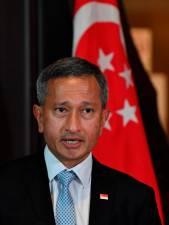SINGAPORE: Singapore will enhance ASEAN integration by upgrading trade agreements and implementing cross-border digital frameworks alongside developing the ASEAN Power Grid and green economy standards.
Foreign Minister Dr Vivian Balakrishnan confirmed Singapore will also expand ASEAN’s partnership network to ensure key international players have a stake in regional success.
“ASEAN remains a cornerstone of our foreign policy and holds tremendous potential through deeper regional integration,” he stated in the Foreign Ministry’s addendum to the President’s Address.
The ministry outlined initiatives under “Securing Singapore’s Place in a Changing World” following President Tharman Shanmugaratnam’s opening of Parliament’s first session.
Singapore will support the Johor-Singapore Special Economic Zone and Rapid Transit System Link to strengthen connectivity and people-to-people ties with Malaysia.
Expanded Framework Agreements with Indonesia on airspace management and defence mark a bilateral milestone enabling cooperation in renewable energy and human capital development.
The Foreign Ministry will strengthen ties with both the United States and China while expanding friendships with middle powers in Africa, Central Asia, Latin America, and the Middle East.
Singapore will launch a Comprehensive Strategic Partnership with New Zealand and a Strategic Partnership with South Korea while opening new diplomatic missions in Africa and Latin America.
The nation is exploring partnerships between CPTPP, the European Union, and ASEAN to preserve open trade flows and build economic resilience.
“We are expanding collaboration in the digital and green economies to create opportunities for Singaporeans in forward-looking areas,” Balakrishnan added.
Singapore will proactively support rules-based multilateralism at the United Nations and WTO while playing a constructive role in plurilateral arrangements.
“By advancing a positive agenda in AI, climate change, and pandemic preparedness, we demonstrate commitment to global stewardship,” he emphasised.
Balakrishnan noted Singapore’s foreign policy must adapt to global trade disruptions, economic weaponisation, conflict risks, weakening multilateralism, power rivalry, and technological change.
The ministry will maintain pragmatic engagement with all countries while reinforcing Singapore’s role as a credible partner and building domestic support for foreign policy. – Bernama
